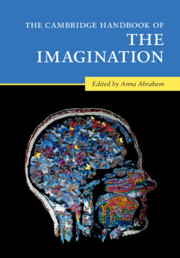Book contents
- The Cambridge Handbook of the Imagination
- The Cambridge Handbook of the Imagination
- Copyright page
- Dedication
- Contents
- Figures
- Contributors
- Acknowledgments
- 1 Surveying the Imagination Landscape
- Part I Theoretical Perspectives on the Imagination
- Part II Imagery-Based Forms of the Imagination
- Part III Intentionality-Based Forms of the Imagination
- 19 Continuities and Discontinuities Between Imagination and Memory: The View from Philosophy
- 20 Imagining and Experiencing the Self on Cognitive Maps
- 21 The Neuroscience of Imaginative Thought: An Integrative Framework
- 22 Imagination and Self-Referential Thinking
- 23 Imaginary Friends: How Imaginary Minds Mimic Real Life
- 24 Imagination and Moral Cognition
- 25 Moral Reasoning: A Network Neuroscience Perspective
- 26 The Future-Directed Functions of the Imagination: From Prediction to Metaforesight
- Part IV Novel Combinatorial Forms of the Imagination
- Part V Phenomenology-Based Forms of the Imagination
- Part VI Altered States of the Imagination
- Name Index
- Subject Index
- References
24 - Imagination and Moral Cognition
from Part III - Intentionality-Based Forms of the Imagination
Published online by Cambridge University Press: 26 May 2020
- The Cambridge Handbook of the Imagination
- The Cambridge Handbook of the Imagination
- Copyright page
- Dedication
- Contents
- Figures
- Contributors
- Acknowledgments
- 1 Surveying the Imagination Landscape
- Part I Theoretical Perspectives on the Imagination
- Part II Imagery-Based Forms of the Imagination
- Part III Intentionality-Based Forms of the Imagination
- 19 Continuities and Discontinuities Between Imagination and Memory: The View from Philosophy
- 20 Imagining and Experiencing the Self on Cognitive Maps
- 21 The Neuroscience of Imaginative Thought: An Integrative Framework
- 22 Imagination and Self-Referential Thinking
- 23 Imaginary Friends: How Imaginary Minds Mimic Real Life
- 24 Imagination and Moral Cognition
- 25 Moral Reasoning: A Network Neuroscience Perspective
- 26 The Future-Directed Functions of the Imagination: From Prediction to Metaforesight
- Part IV Novel Combinatorial Forms of the Imagination
- Part V Phenomenology-Based Forms of the Imagination
- Part VI Altered States of the Imagination
- Name Index
- Subject Index
- References
Summary
We spend large portions of our inner lives imagining social events and situations that fall under the umbrella of moral cognition. For example, we may simulate in our mind a future scenario in which we have to decide whether to withhold the truth to protect a colleague or a friend and wonder if it is the right thing to do or not. Or we may do the same for a past event or situation. This chapter briefly introduces the field of moral cognition with a focus on dual processing approaches, and then provides a critical review of recent empirical studies about the effect of various forms of mental simulations on a subset of moral cognitive processes. A number of behavioral studies show that imagination can affect moral cognitive processes in multiple ways, from enhancing our emotional responses to personal moral dilemmas and guiding our moral judgments, to facilitating theory of mind simulations and perspective-taking in prosocial scenarios. Ideas for future directions in the field are discussed in the final section.
Keywords
- Type
- Chapter
- Information
- The Cambridge Handbook of the Imagination , pp. 390 - 405Publisher: Cambridge University PressPrint publication year: 2020
References
- 1
- Cited by

